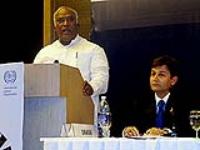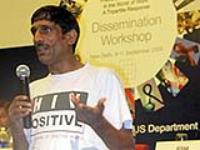Today, October 7 2009, we mark World Day for Decent Work. The International Labour Organization, a Cosponsor of UNAIDS, works towards achieving the globally endorsed goal of Decent Work. Rights at work include freedom from discrimination, expansion of employment opportunities, social protection for all and social dialogue.

Supporting the rights of people living with HIV in the workplace: The Honourable Shri Mallikarjun Kharge, Union Minister of Labour and Employment (speaking) and Syed Mohammad Afsar, ILO’s HIV and AIDS Technical Specialist for South Asia and National Project Coordinator for India
Picture courtesy of ILO
An innovative tool in India’s response to HIV in the world of work has just been launched by the International Labour Organization (ILO) and the India Network of People living with HIV/AIDS (INP+). The two organizations have come together to release a unique training video and handbook package aimed at guiding those living with the virus in AIDS advocacy in the workplace.
Unveiled by the Honorable Shri Mallikarjun Kharge, Union Minister of Labour and Employment, the package contains testimonies from people living with HIV (PLHIV) in workplace settings as this has proven to be a very effective training initiative in the past. Practical, and offering step-by-step guidelines, it is designed to encourage HIV-positive people to be open about their status and spread the message of tolerance, anti-discrimination and respect for human and employment rights for those affected by the virus across the country.
The video and handbook have been developed with contributions from more than 100 people living with HIV and are available in both English and Hindi.
We cannot stress enough the importance of the rights of people living with HIV – to respect, dignity, access to care and treatment, and here in this project, the right to work. Building the capacity of people to advocate this is critical and we salute the achievements of ILO and INP+ in this regard.
Charles Gilks, UNAIDS Country Coordinator, India
One active participant in this process is Hari Singh, a board member of the Delhi Network of People Living with HIV, who has been working with the ILO in advocacy initiatives since 2007. He spoke at the launch of his growing confidence in talking about his HIV status. He now speaks to employers, workers and trade unions about his life experience and provides clear and specific anti-AIDS messages.
As in many other countries and communities, AIDS stigma and discrimination are still rife in Indian society, including the workplace, and a number of individuals have been hounded from their jobs because of their status. According to Naveen Kumar of the Delhi Network of Positive People, this can have devastating consequences: “If you take away our jobs, you will kill us faster than HIV.” Removing punitive laws, policies, practices and stigma and discrimination that block effective responses to AIDS is one of the nine priority areas in the UNAIDS Outcome Framework 2009-2011.
This latest intervention is part of an ongoing umbrella project spearheaded by the ILO in India, the first country in the world to implement an ILO technical cooperation project on HIV following the creation of the agency’s programme on HIV/AIDS and the world of work in 2001. From the very beginning, a person living with HIV has been represented on the ILO Project Management Team.

Hari Singh addresses the launch of the video and handbook package. He has been working with the ILO to make sure that the voices of PLHIV are heard in the workplace.
Picture courtesy of ILO
“The ILO in partnership with INP+ has been actively pursuing the principle of right to employment and other basic employment-related rights of PLHIV in the development and implementation of HIV workplace policies and programmes,” explains K.K. Abraham, INP+ president.
As Syed Mohammad Afsar, ILO’s HIV and AIDS Technical Specialist for South Asia and National Project Coordinator in India maintains, “Work is just as important as treatment for people living with HIV. The ILO Code of Practice on HIV/AIDS and the world of work includes non-discrimination for purposes of employment as one of its key principles. People should be allowed to work and earn a living as long as they are fit to work.”
The ILO India project has been supported by the United States Department of Labour and, more recently, by the US President's Emergency Plan for AIDS Relief (PEPFAR). It is now seen by many as something of a yardstick for other programmes executed by the ILO with ministries of labour and with employers’ and workers’ organizations to address AIDS in the world of work.
“In the ILO project, we have been building the capacity of people living with HIV and engaging them from the beginning. So far, 165 PLHIV from 20 networks in India have been trained in workplace advocacy programmes,” Mr Afsar added.
According to Charles Gilks, the UNAIDS Country Coordinator for India, the initiative is highly welcome. “We cannot stress enough the importance of the rights of people living with HIV – to respect, dignity, access to care and treatment, and here in this project the right to work. Building the capacity of people to advocate this is critical and we salute the achievements of ILO and INP+ in this regard.”




